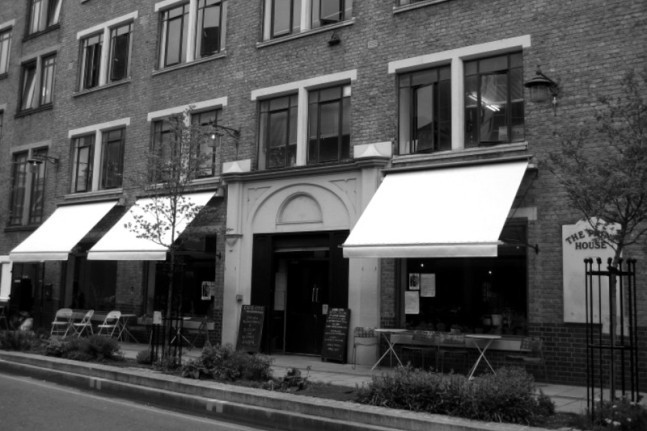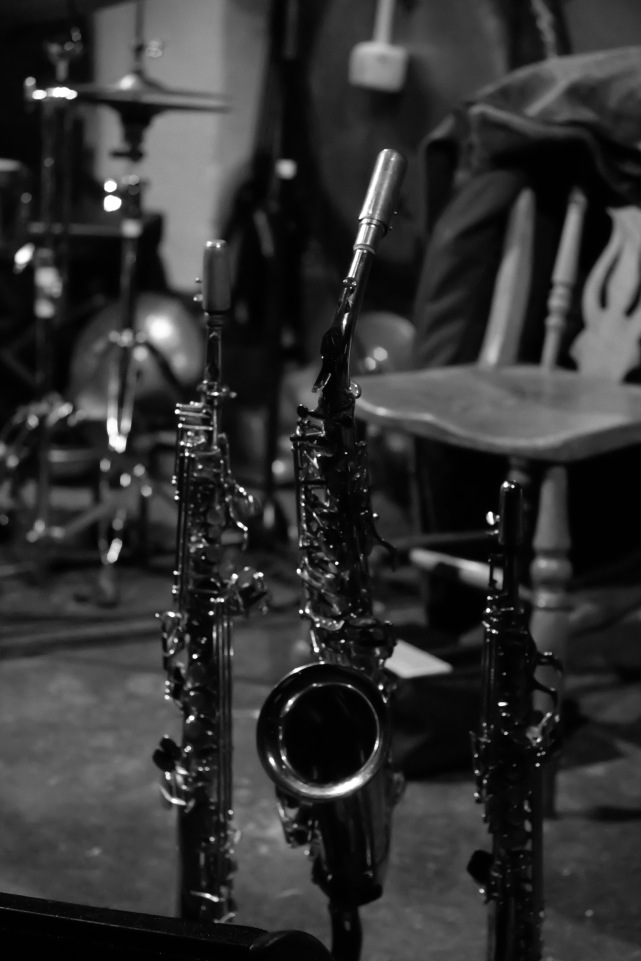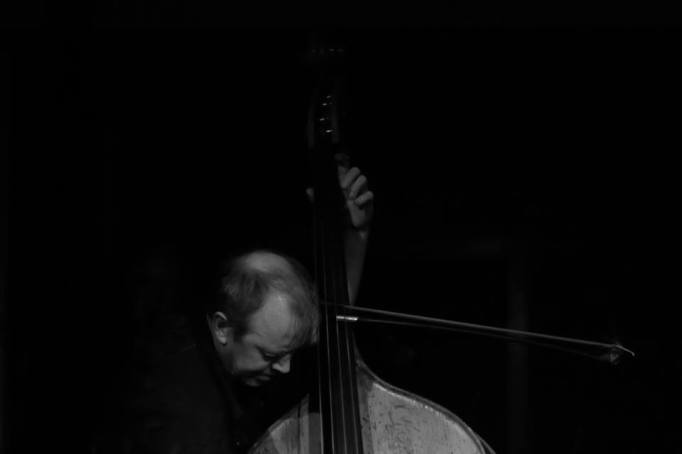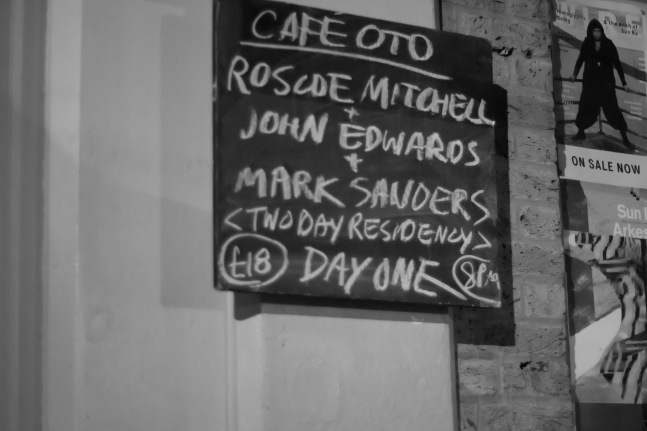Nearly a decade ago, on a rainy afternoon, I found myself wandering the streets of Dalston in London’s East End. This was before the neighborhood became trendy. It was the out of the way home for Turkish and Nigerian families with a scattered community of artists – known mostly for the Ridley Road Market, a swirling world of slightly putrid meat, produce, African fabrics, and everything in between. Somewhere around the junction I ran into my friend Sam. He explained that he was on his way to help a friend fix up a new experimental music venue. Curious, I joined him to see what was soon to be Cafe Oto and meet his friend Hamish.
I’ve been a fan of avant-garde and experimental music since my teens, but was skeptical. Before Oto, performances in London usually took place in the back rooms of pubs and were poorly attended. I’d recently witnessed the heartbreaking demise of Tonic in NY and couldn’t imagine a similar venue surviving.
In the months following Oto’s opening, I became a regular attendant. It’s first year was heavily focused on Japanese experimental music. It was an ambitious gesture which gave opportunity to neglected sounds. I was grateful to hear from artists who rarely ventured west. As good as it was, I still wondered how Oto was going to make it. The avant-garde has a limited audience. It was going to take a lot to survive. I counted my blessings and decided to be happy while it lasted.
During those early days Hamish and Keiko (Cafe Oto’s co-founders) managed to keep the doors open without sacrificing an ounce of integrity. They gave Oto everything they had and rarely left. I remember the look of exhaustion in their eyes and my grateful shock that they were pulling it off. The great shows kept coming, the word was getting out – little did I know they were barely scrapping by. As time passed Oto’s program began to stretch and broaden. New sounds began to creep from the stage – many were profound revelations.
Free-Jazz enjoys a devotion in my life, equal to no other. For many years I regarded it as an exclusively African American idiom, and cast a dubious ear to its European realizations. I respected figures like Peter Brotzmann, Alexander Von Schlippenbach, Han Bennink, Derek Bailey, Evan Parker, and groups like AMM and the Scratch Orchestra, but I never gave them much of a chance. I thought of them as imitators (with the exception of Bailey) of this great American music – who, divorced from the context of its birth, were incapable of its heights. During its second year, Oto began to host evenings of improvised music. A number of the names were familiar from my flirtations with the Incus catalog and related releases. One evening I wandered down. I didn’t have high hopes, but couldn’t think of anything better to do. I can’t remember the line-up, but it took me days to recover. The performance knocked the wind out of me. It was one of the best nights of Jazz I’d seen since my youthful excursions to Fred Anderson’s Velvet Lounge on the South-Side of Chicago. I couldn’t believe my ears, and became an instant convert. This inexplicable group of British musicians had labored in the shadows, honed their craft, and reached uncharted territories. This Free-Jazz wasn’t the same as its American counterpart, but towered to equal heights. Over the next couple of years Oto hosted countless ensembles which combined players like Steve Noble, John Edwards, Tony Marsh, John Tilbury, John Butcher, Paul Lytton, Eddie Prevost, Tony Bevan, among dozens of others. I was hooked and couldn’t stay away. Each gig offered revelation after revelation. It was thrilling. What had been discarded or beyond my awareness, became an object of total devotion.
Oto opened my ears and my heart. At risk to itself, it placed me in the midst of some of the most riveting music I have ever heard. Was this its only achievement, I’d be forever grateful. Remarkably, it was only the beginning of Oto’s enormous contribution. As its reputation began to grow, its ability to host high profile artists increased. When given opportunity, they leapt at the chance, but with thin resources often lost money and found themselves unable to afford the expenses of an entire band. Faced with an impossible situation, they began offering headliners a “pick-up” band drawn from the local pool of musicians. The compromise was usually met with approval and the shows went on. I doubt anyone knew what they were getting into. During the first few years of Oto’s existence, these were the circumstances in which I saw many of the remaining giants of Free-Jazz. The “Name” backed by John Edwards on bass, and often Eddie Prevost, or Steve Noble on Drums, with other musicians traded in or filling out the ensemble. At each these gigs, I began to witness a pattern develop. The “Name” would come onto the stage – filled with confidence, and begin to blow. They probably didn’t have high expectations for British musicians or audiences. As the rhythm section and other accompanists rose from behind, panic would slowly creep across his face. The energy would rise, the interplay would lock and break, the “Name” would try to keep up, and fall behind as the ante raised. I’m not sure how many other people picked up on it, but it was a crazy thing to witness. My heroes trounced by a bunch of white guys from London. It defied logic, but there it was.
It’s easy to forget when you focus on the present, but over the years Free-Jazz has lost many of its leading lights. Old age, cancer, drugs – one thing or another has taken them down. Those who remain are often forced to play with ensembles made up of younger, less committed or practiced musicians. I’m sure it has its advantages, but everyone knows great music grows from interplay. No one gets anywhere sitting on their laurels and without a challenge. What I witnessed time and time again at Oto was the rare gift of conversation. The re-ignition of a fire lost with the passing of peers and contemporaries. As the shows came to a close, the pattern concluded with the same consistency – the “Name” offering deep respect, and demanding to know when he could come back. When they did return, the pattern was a thing of the past. The “Name” brought fire.. and the fucking tunes!
Cafe Oto’s greatest contribution has been to the musicians who have played there. Those of us in the audience have been incredibly fortunate to hear it unfold. The venue gave a platform for the advancement of music and entry into a discourse which pushed artists toward the full extension of their talents. It’s a remarkable gift, and a forum, in the field of Jazz, that doesn’t occur often. Oto breathed life into this music, and created a cross culture and intercontinental discourse of sound. Countless albums, tours, and relationships have grown from encounters on its stage. Oto pushed Jazz from the brink of becoming a historical idiom, gave it a home and a reason to remain an evolving vital art form. Whatever the future holds, it owes a great deal to a small stage on a back street in Dalston.
My companion for many of these evenings was one of my dearest friends, the musician John Chantler. Over coffee one day, John confessed that he was leaving his day job and going to work for Oto. He’d been asked to help run the program. John’s an amazing guy and few could be better suited for the job. He has a towering and diverse knowledge of music. His curiosity and enthusiasm continuously push him into the outer reaches. Together, John, Hamish and Keiko began a new phase in the life of the venue. They expanded into more ambitious territory, diversified, took greater risks, and began to shape Oto into the remarkable place it is today.
For all its struggles, experimental music is a fractured reality. Its spectrum is vast. Principles and protectionism run high. New York during the decade that followed the demise of Tonic exposed this. Spaces sprang up, or stepped in, to fill the void, but overlap is rare. Scenes are divided, insular, and regularly critical of the next – each promoting its own taste, modus, and vision for the future. For a small community, this seems absurd. Music should be in discourse, with artists and fans offering support and growing together. As Oto evolved, it began to bridge these gaps. Its program grew into a knotted complex conversation. Unexpected sounds speaking over nights, weeks and months – always ambitious and never easily pinned down. Multiple generations, across diverse genres of music, continuously crossing paths and forced into conjunction – spawning relationships both sonic and social. This is a remarkable achievement. Oto created a context for sound to exist in conversation, bridging the temporal and cultural divide, with perspective and cohesion. Rather than promoting a single vision or ideology, it folds diversity under its wing and gifts countless artists its support. It protects them from a difficult path, and shields them from neglect. If a thing is the sum of its parts, Oto is a great thing indeed.
The experimental music world is small. Shows rarely sell out, whatever the capacity. You see the same faces again and again. I’d estimate that New York and London have between 50 and 100 regular attendants of gigs. For cities in the millions, that isn’t many. Being a member of the audience at Cafe Oto is a unique experience. It’s incredibly focused. The room is still. You listen. It’s a respectful, intense, and wonderful enviroment to hear sounds unfold. During its first few years, Oto rarely sold out. Given the small audience for experimental music, and that fact that the room’s capacity was around 200, it wasn’t surprising. At some point it started filling up. New faces were drifting in. Shows began selling out – sometimes long in advance. During the early years I could wander down at a whim, now I begrudgingly had to think ahead. It was surprising and remarkable. Backgrounds broadened and these new faces were returning. Punters became fans with a blossoming dedication to this music. In other words, Cafe Oto, through sheer force of will and the remarkable quality of their program, was bringing new unexpected audiences, both young and old, to the outer reaches of sound and sustaining them. Experimental music’s traditional audience is intuitive. We were not drawn there, we belonged. To draw audiences from outside of those bounds is amazing, inexplicable, and something that any fan of this music should all applaud. It is something few have ever managed.
Looking back toward the beginning, it seems absurd that Hamish and Keiko embarked on the gesture they did. It was profoundly generous and against the odds. What they’ve achieved is incredible. Everywhere I go, people speak Oto’s name. This narrative was drawn from a tale I’ve told countless times in dozens of countries. When people hear I lived in London, Oto is the first question I’m asked. It has become an institution. A haven for the sonic arts and one of the rare gestures of capitalism that gives far more than it could ever earn. Among many things, it was Oto’s tireless support of others that made me consider beginning this sight as a gesture of similar terms. I am singing their praise as they have done for so many. Over the years I’ve attended hundreds of shows between its walls. Each rewarding and bringing wonderful challenges into my life. I’ve been fortunate to have graced its stage with my humble solo efforts, as a member of the Organ Octet with our rotating cast of John Chantler, Carina Thoren, Duke Garwood, Dom Garwood, Dale Berning, Jamie Quantrill, Matt Nicholson, Jodi Cave, Sam Jones, Alexander Tucker, Sébastien Roux, and Lawrence English, and as a member of the ensemble that premiered Lawrence’s Lonely Women’s Club – a beautiful mutated reworking of Jim O’rourke’s Eureka for organ. It hosted many of my closest friends from the corners of the globe, sustaining my sense of community and kept me connected to those nearest to my heart. It made my world complete.
During my final years in the London, many of my closest friends began to drift away. For some, it was time for a change, others were forced by conservative policy and the legacies of their economics. I found my community in exodus. In the end I departed as well, leaving my life behind for New York and beyond. John and his wife Carina have since relocated to Stockholm where John has been continuing his dedication to wonderful music through his own work, with his incredible Edition Festival and other projects. Despite the sadness of leaving London and the scattering of my dear friends, my departure was made hardest by leaving Oto. It was the axis of my life. Its absence from my daily routine makes me question every decision. It is one of the most wonderful places on the planet. Without it, my life isn’t the same, nor would it be for many others.
-Bradford Bailey





Pingback: The Ark of Oto (Otoroku) | The Hum